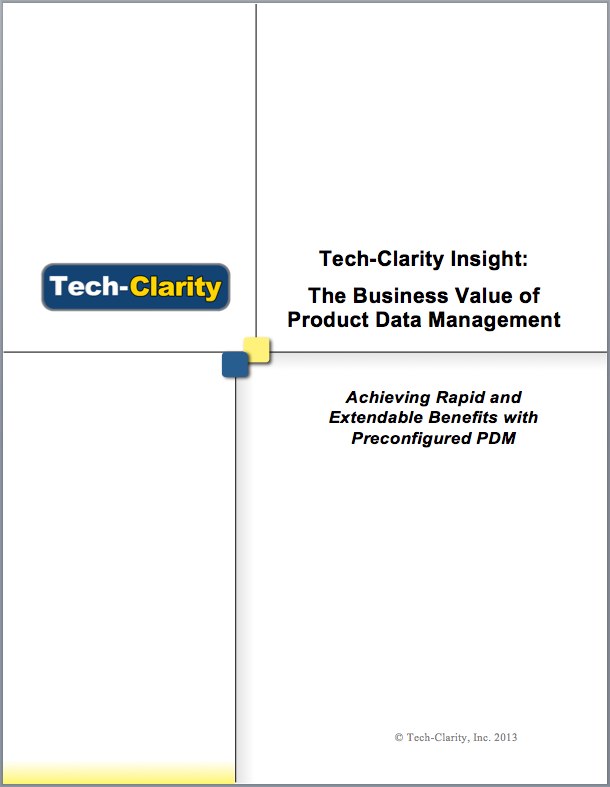 The Business Value of Product Data Management – Achieving Rapid and Extendable Benefits with Preconfigured PDM shares the perspectives of three small to midsize manufacturers on the value they receive from PDM software. The report also offers Tech-Clarity’s views on the business value of PDM and explains how preconfigured PDM solutions can help companies gain value quickly and cost effectively.
The Business Value of Product Data Management – Achieving Rapid and Extendable Benefits with Preconfigured PDM shares the perspectives of three small to midsize manufacturers on the value they receive from PDM software. The report also offers Tech-Clarity’s views on the business value of PDM and explains how preconfigured PDM solutions can help companies gain value quickly and cost effectively.
Please enjoy the summary below, or click the report to download a PDF overview (free of charge, no registration required).
For the full report, please visit the Teamcenter Rapid Start page on the Siemens PLM website (free of charge, registration required).
Table of Contents
- Executive Overview
- The Business Value of PDM – Controlling Product Data
- The Business Value of PDM – Making Product Data Accessible
- The Business Value of PDM – Sharing Product Data
- Achieving Value Quickly with Preconfigured PDM
- Getting Started
- Taking Advantage of (and Extending) the Benefits
- Conclusion
- Recommendations
- About the Author
- About the Research
Executive Overview
Manufacturers today face challenging markets and an uncertain global economy. To survive they are trying to improve the speed of product development despite reduced headcount and budgets. One positive note is that many manufacturers are gaining significant value by implementing product data management (PDM) solutions. Tech-Clarity interviewed several small to midsize manufacturers (Table 1) to understand their experiences. Each of these companies implemented PDM for different business reasons, although several common themes were repeated. These themes are consistent with previous research on the topic, and include:
- Control and secure product-related data
- Improve the ability to quickly find and reuse information
- Share product knowledge and collaborate with other departments
Manufacturers turn to PDM to take control of their product information and get more value from it. These solutions help companies manage their data and processes and make them accessible to their Engineering peers and downstream departments. As a result, PDM helps companies achieve business benefits including increased efficiency, improved quality, reduced cost, and the ability to bring products to market much faster. PDM also serves as a foundation to support more advanced capabilities including advanced configuration management, multi-CAD support, and a broader product lifecycle management (PLM) implementation offering even greater business value.
| Company | Description |
| Veeraja Industries | Total solutions provider of coolant filtration, chip removal and coolant management |
| Flovel Energy | Fully integrated hydro power equipment supplier |
| Weir Valves & Controls | End-to-end whole plant solutions to nuclear, fossil-fired and renewable power stations |
Table 1: Companies Interviewed
Discussions with these manufacturers reveal a lot about their PDM implementations. For example, implementing the software without significant modifications helps companies achieve benefits more rapidly. Companies can accomplish this by using preconfigured, or “out of the box” PDM solutions. These solutions offer predefined settings and data such as roles, reports, attributes, and forms to allow manufacturers to get up to speed quickly. They also provide best practices embedded in predefined workflows so manufacturers don’t have to invent processes from scratch where they currently have manual or outdated processes. This preconfigured approach allows companies to get up to speed quickly and expand their capabilities over time to gain further benefits.
Note: This paper is an updated version of the findings from a 2011 paper titled Tech-Clarity Insight: The Business Value of Product Data Management – Achieving Rapid and Extendable Benefits.
